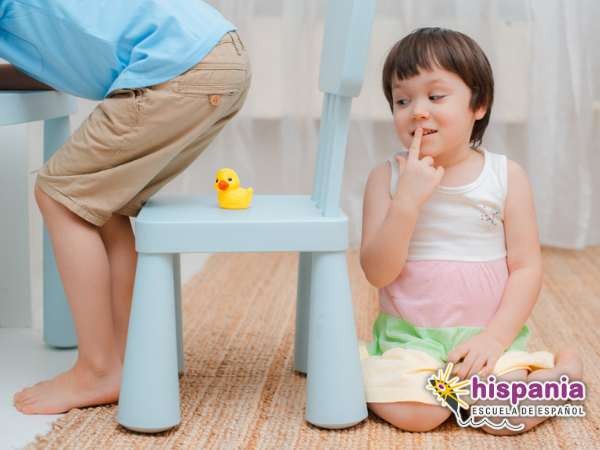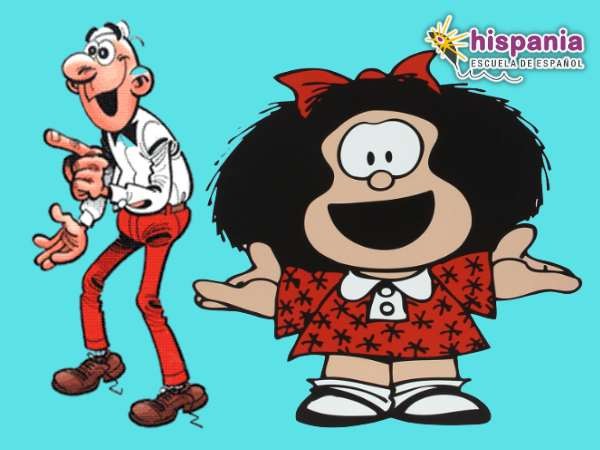Jokes and pranks in Spanish: Spanish
绿色建筑是LEED(Leadership in Energy and Environmental Design)等认证体系的一部分 #生活常识# #环保生活Tips# #绿色建筑#
How are you? How is your day?
If you are having a tough day, we hope this article changes your mood for the better.
Today we are going to talk about the jokes and jokes vocabulary.
We are going to deal with this topic in a very complete way. The idea is that you learn related vocabulary about humor.
First, we'll talk a little about what is spanish humor like and some important considerations.
Then we will see the different types of humor there are, and a lot of vocabulary about how to talk about humor, jokes and jokes.
We will also talk to you about three Spanish-speaking cartoon artists that have made us laugh for decades.
Finally, we will see some examples of funny puns and jokes in Spanish.
Without a doubt, a very fun and original article.
Do you know what else you can do to learn Spanish in a fun way? Come to our school!
En Hispania, escuela de español Our maxim is that people be happy while learning the language.
In our face-to-face Spanish courses We strive to create interactive and dynamic classes.
Siempre we alternate the different communication skills with written activities and other more playful ones.
And now, let's finally start this article about jokes and pranks in Spanish.
Let's laugh!

Shutterstock.com
The Spanish sense of humor
How are the jokes and humor in Spain?
It's hard to generalize about this.In the end each person has their own sense of humor.
However, there are some common characteristics in each of the regions of Spain.
Spanish humor can be defined by the following characteristics:
irony and sarcasm: Spanish humor is often characterized by its use of irony and sarcasmSpaniards often use language in a witty way to express their opinions indirectly. Double entendres and ironic responses are common in everyday conversations.self-criticism: The Spanish tend to laugh at themselves and their own culture. Self-criticism is an important part of Spanish humor, and they often make fun of national stereotypes and clichés.Local and regional jokes: Spain has great cultural and linguistic diversity, and each region has its own distinctive humor. Local and regional jokes are often based on stereotypes and rivalries between different regions, which can lead to a friendly and competitive mood.Cultural and political references: Spanish humor is often based on cultural and political references. Current events and public figures are mocked and satirized on comedy shows and in the press.These are some of the keys to Spanish humor.
Every culture has its humor: be careful with jokes
It is necessary to highlight that each culture has its own way of seeing humor, and this can lead to cultural clashes and misunderstandings.
You have to have the wide open mind y cultivate tolerance so that these cultural clashes are not conflictive.
We need to think of these differences as positive, rather than seeing them as threats to our own culture.
However, always keep in mind who you are with and be careful with jokes what you do Maybe your jokes may be offensive to others. People from other countries.
You have to be very observant in this sense.
Connect with the humor of a new language
Is it easy to connect with humor of a new language? Well, it depends on the person and the language we are learning.
If you learn a language from a nearby country, it is normal that the sense of humor be more similar to that of a distant country.
Likewise you will always find differences.
To fully connect with the humor of a new language and make jokes like a true native, It takes a lot of time and years of living with that language.
If you want to understand and do funny jokes in Spanish perfectly, you need get an advanced level and talk a lot with Spaniards.

Shutterstock.com
Types of humor
Now we are going to see vocabulary of some of the types of humor more common that exist in Spanish.
white humor
white humor It is a style of comedy that is characterized by its lack of offensive content, vulgar or controversial.
It's usually around friendly for all ages and does not mock social groups, cultures or individuals.
Se focuses on jokes with puns that do not cause harm or offend anyone.
Black mood
black humor It is a style of comedy that is based on taboo topics, inappropriate or sensitive, such as death, illness, disability or tragedy.
This type of humor often uses provocation to address topics that are generally considered unacceptable.
Black humor can be offensive to some people.
green humor
The green humor refers to the type of humor that revolves around sexual themes.
It is usually so vulgar and inappropriate that it causes laughter and humor.
Words to talk about humor
Let's go now with him Spanish vocabulary to talk about humor.
This section will be divided into 4 subpoints:
Differences between joke and joke.Talk about jokes.Talk about jokes.Evaluate a joke or a joke.Differences between joke and joke
Do you know what the difference between a joke and a joke?
Many students confuse these terms, but they are not exactly the same.
Let's see this difference with its most common verbs.
say something jokinglyIt means that you are expressing something of humorous or non-serious way, with the intention of making people laugh or causing fun.
Es important for people to understand that you are joking and that they should not take your words seriously.
say something jokingly implies a humorous tone o sarcastic, and others are expected to interpret it that way without intending to offend.
Tell a jokeWhat is a joke?
the jokes are humorous fictional stories that have a play on words, comic situations and unexpected final surprises.
They are designed for provoke laughter of those who listen to them.
There are many types of jokes: good jokes, bad jokes, word jokes, character jokes, dirty jokes, long jokes, animal jokes, jokes with double meaning, profession jokes, jokes with names, one sentence jokes, etc.
As you can see, in Spain we love to tell jokes.
If you last until the end we will show you some funny jokes so you can tell your friends. Let's see if you understand them!

Shutterstock.com
talk about jokes
Now you are going to learn some expressions to talk about jokes.
When our way of speaking is humorous and what we say is not serious, it is said "joke" o «to joke».
We can also "make jokes", that is, say funny things to laugh.
There is an adjective for people who love to make jokes: «be a joker».
talk about jokes
We have already said that the jokes are small stories with comic situations and funny endings.
When we tell a joke we use the verb "tell a joke".
This same verb is used to tell any story:
Tell a story, tell a story, tell an experience, tell an anecdote, tell a trip, etc.
When a person is funny, talks in a funny way or has a curious appearance, we can say that «he is a funny person»
Evaluate a joke or a joke
As we can rate and respond to a joke or a joke?
We'll tell you below!
make funWe use this verb to express that we like a joke or a joke and we find it funny.
The verb do in this case is conjugated as a verb of type like.
We must use appropriate personal pronouns and use the word «grace» with each person, without any change.
Furthermore, this verb can also go accompanied by nouns or infinitives, just like the verb gustar.
Here are some examples of the present indicative, emphasizing the pronouns in capital letters so you remember them:
To me ME this joke is funny
To you TE It's funny Lola
To her LE this movie is funny
U.S OUR the situation is funny
To you OS that joke is funny
To them THE that person is funny
give laughterThis verb is very similar to the previous one.
Furthermore, it is also conjugated as a verb of type like: It makes me laugh, it makes you laugh, it makes you laugh, etc.
There is a slight difference in meaning. When we say that something «makes you laugh»means that makes us laugh.
It is a higher level than «make fun», since something can make you laugh without causing a burst of laughter.
Be funnySomething or someone funny is that cause fun.
There are many people who are funny.
Also other things like a book, an animal, a show or a movie.
Crack upThis is a reflexive verb which is used to indicate that something it makes us laugh a lot.
The meaning of the verb is already funny and very exaggerated, since what it is saying is that our body breaks from laughing so much.
For example:
I burst out laughing with Toni's jokes.Not having even a hint of graceThis is a way to react negatively to a joke or a joke.
It means that we don't find it funny at all.
It is used to show that the joke someone makes is not funny or has bad taste.
For example:
that joke It's not even a bit funny. Don't do it again.be bad/goodAnother way to evaluate a funny comment or a joke positively or negatively is by using the "good" adjectives y «bad».
For example:
that joke is very good. I'm going to tell my friends.that joke it's so bad It's embarrassing to hear it.
Humor vignettes to learn Spanish
Humor is a great way to to learn Spanish.
There are many television shows, podcasts, books... you can use the medium you like best.
We are going to talk to you about one that you may not know as much but that is wonderful: the comic cartoons.
We have authors who tell humorous stories through comics and vignettes on a single page with cartoonish characters.
Many deal with current affairs, cultural stereotypes and social or political satires.
Understanding them can mean a high knowledge of Spanish culture and of the language.
Next, we are going to talk to you about three comic and cartoon artists Spanish speakers who have made us laugh for decades.
Will you be able to understand his humor?
Let's check it out!
Forges
Antonio Fraguas de Pablo (1942 – 2018) was a famous cartoonist of humorous cartoons in Spain, known as Forges.
He stood out for his political and social satire, creating iconic characters such as, «Forgesito» y «Marian».
These characters represented the voice of the common citizen, allowing you to effectively convey the feelings and concerns of society.
Throughout his career, Forges received numerous awards and recognitions both in Spain and abroad.
His influence extended beyond cartoons, as he also wrote books and collaborated on television programs and media.
Quino
Joaquín Salvador Lavado Tejón (1932 – 2020) was an Argentine cartoonist and humorist famous for being the creator of the iconic comic strip Mafalda, known as Quino.
This comic strip features a six-year-old girl named Mafalda, who reflects on social, political and philosophical issues in his search for a better world.
The strip has been translated into numerous languages and has gained fans around the world.
Quino addressed important and current topics, such as politics, social injustice, education and technology.
He always treated them with a sharp humor y a simple but profound style at the same time.
His vignettes were accessible for all ages and that is why they were so popular.
Ibanez
Francisco Ibáñez Talavera (1936 – 2023) is known mainly for being the creator of Mortadelo and Filemon, one of the most popular and long-lasting comic series in Spain.
Ibáñez is known for his ability to portray Spanish society over the years in a very parodic and fun way.
Ibáñez's drawing style is unique and easily recognizable.
Their characters have exaggerated features and comic expressions, which contributes to the humor of his stories.
If you like comics, you have to take a look at Ibáñez's works!
Fun word games
Now we are going to propose some fun word games to learn Spanish.
They are very easy to understand, here they go!

Shutterstock.com
Types of jokes
In this article we have talked about jokes, but we haven't told you any yet!
In Spanish there are thousands of funny jokes to laugh of all types. We are going to show you 4 Types:
Tantan jokes.Doctor jokes.Jaimito jokes."What's the last straw" jokes.Do you feel like laughing a little? Then read the following good short jokes!
tantan jokes
Tantan jokes are called that because they all have the comparative adverb "so".
The music is taken from short funny jokes that greatly exaggerate the qualities of a person, creating bizarre and surreal situations.
For example:
Doctor jokes
Doctors are protagonists of very funny jokes Spanish in which very comical dialogues are created between them and the patients.
Let's look at three examples!
A) Doctor, doctor, I feel bad. B) Well, sit well, gentleman.A) Doctor, I have broken my arm in several places. B) If I were you, I wouldn't return to those places.A) Doctor, my hair is falling out, can you give me something to preserve it? B) Yes, of course, here's a shoe box.Jaimito Jokes
Jaimito is the protagonist of some of the best jokes and pranks Spanish.
It's about a child who has a rather curious way of thinking and is always involved in funny dialogues.
For example, in the following short spanish jokes:
A) Jaimito, tell me 5 animals of African origin. B) Five elephants, teacher.A) Mother! Today I played the best game of my life, I scored 3 goals. B) Very good son, how are you? A) We lost 2-1.A) Jaimito, what have you learned in class today? B) Well, not enough mom, since I have to go again tomorrow."What's the last straw" jokes
Expression "to be the height of something" is used for describe a situation in which something has arrived maximum point of the unusual, ironic or absurd.
There are many laughing jokes who use this expression to tell humorous stories, often with jobs. Let's look at some examples:
What is the last straw for a florist? Called Margarita Flores del Campo.What is the height of a hairdresser? Missing the train by a hair and realizing that nothing is permanent.What is the height of a high jump champion? Have morale on the ground.These are just a few examples, but there are many more.
The good spanish jokes They are a very fun way to learn Spanish vocabulary and learn about Spanish culture from a very fun social approach.
Humor is very important, and we in Hispania, escuela de español we always keep it in mind.
We strive to help you learn Spanish in the best way possible and also have fun in class with your classmates.
So, if you want to learn Spanish and have a great time at the same time, we are waiting for you at our school!
do you know any other spanish joke?
Are there any similar to the ones we have told in your language?
Tell us in the comments, we want to laugh for a while.
Until next time!
Article written by Carlos Martínez for Hispania, escuela de español.
网址:Jokes and pranks in Spanish: Spanish https://klqsh.com/news/view/220848
相关内容
Current time in ArizonaBest 30 Espresso Shops in Newport Beach, CA
Dr. Seuss
Cat, Hat
The 18 Best French Restaurants and Bistros in NYC
The 10 Best Wedding Venues in Jacksonville
Screening for depression in primary care with Patient Health Questionnaire
World Heritage Sites and Biosphere Reserves
What is a Spaghetti Western — History and Legacy Explained
梅西英文简介

